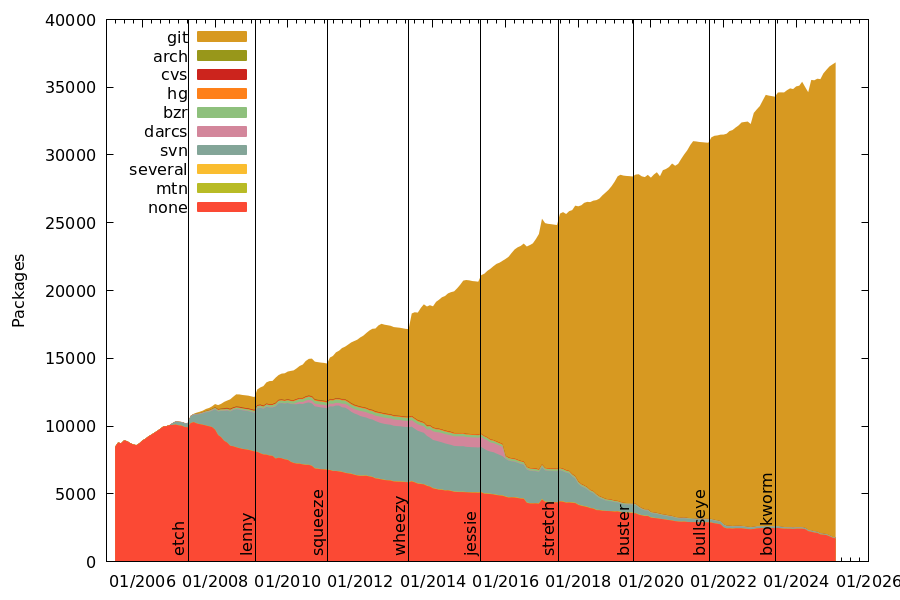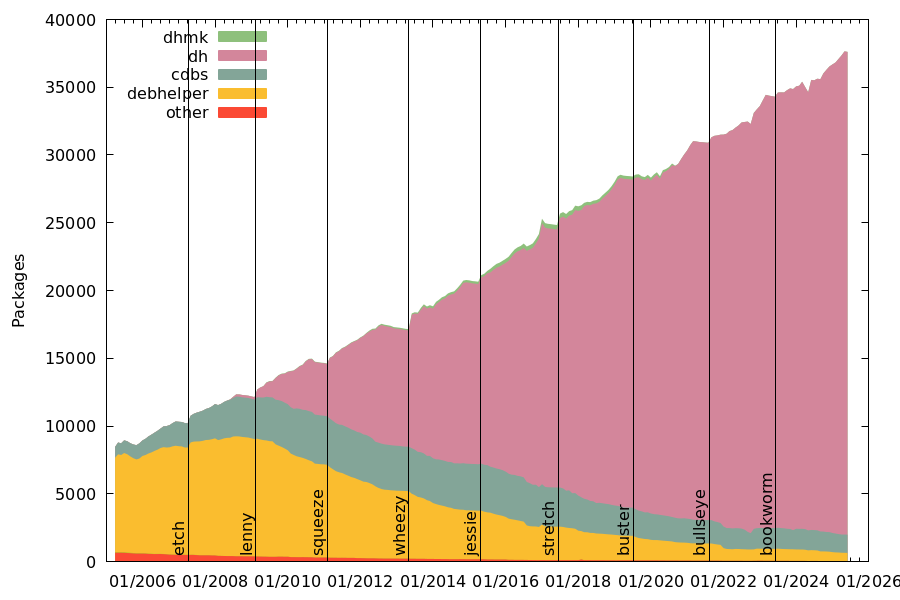I decided to start work on repeating the tests for my
2006 OSDC paper on Benchmarking Mail Relays [1] and discover how the last 15 years of hardware developments have changed things. There have been software changes in that time too, but nothing that compares with going from single core 32bit systems with less than 1G of RAM and 60G IDE disks to multi-core 64bit systems with 128G of RAM and SSDs. As an aside the hardware I used in 2006 wasn t cutting edge and the hardware I m using now isn t either. In both cases it s systems I bought second hand for under $1000. Pedants can think of this as comparing 2004 and 2018 hardware.
BIND
I decided to make some changes to reflect the increased hardware capacity and use 2560 domains and IP addresses, which gave the following errors as well as a startup time of a minute on a system with two E5-2620 CPUs.
May 2 16:38:37 server named[7372]: listening on IPv4 interface lo, 127.0.0.1#53
May 2 16:38:37 server named[7372]: listening on IPv4 interface eno4, 10.0.2.45#53
May 2 16:38:37 server named[7372]: listening on IPv4 interface eno4, 10.0.40.1#53
May 2 16:38:37 server named[7372]: listening on IPv4 interface eno4, 10.0.40.2#53
May 2 16:38:37 server named[7372]: listening on IPv4 interface eno4, 10.0.40.3#53
[...]
May 2 16:39:33 server named[7372]: listening on IPv4 interface eno4, 10.0.47.0#53
May 2 16:39:33 server named[7372]: listening on IPv4 interface eno4, 10.0.48.0#53
May 2 16:39:33 server named[7372]: listening on IPv4 interface eno4, 10.0.49.0#53
May 2 16:39:33 server named[7372]: listening on IPv6 interface lo, ::1#53
[...]
May 2 16:39:36 server named[7372]: zone localhost/IN: loaded serial 2
May 2 16:39:36 server named[7372]: all zones loaded
May 2 16:39:36 server named[7372]: running
May 2 16:39:36 server named[7372]: socket: file descriptor exceeds limit (123273/21000)
May 2 16:39:36 server named[7372]: managed-keys-zone: Unable to fetch DNSKEY set '.': not enough free resources
May 2 16:39:36 server named[7372]: socket: file descriptor exceeds limit (123273/21000)
The first thing I noticed is that a default configuration of BIND with 2560 local IPs (when just running in the default recursive mode) takes a minute to start and needed to open over 100,000 file handles. BIND also had some errors in that configuration which led to it not accepting shutdown requests. I filed
Debian bug report #987927 [2] about this. One way of dealing with the errors in this situation on Debian is to edit /etc/default/named and put in the following line to allow BIND to access to many file handles:
OPTIONS="-u bind -S 150000"
But the best thing to do for BIND when there are many IP addresses that aren t going to be used for DNS service is to put a directive like the following in the BIND configuration to specify the IP address or addresses that are used for the DNS service:
listen-on 10.0.2.45; ;
I have just added the listen-on and listen-on-v6 directives to one of my servers with about a dozen IP addresses. While 2560 IP addresses is an unusual corner case it s not uncommon to have dozens of addresses on one system.
dig
When doing tests of Postfix for relaying mail I noticed that mail was being deferred with DNS problems (error was Host or domain name not found. Name service error for name=a838.example.com type=MX: Host not found, try again . I tested the DNS lookups with dig which failed with errors like the following:
dig -t mx a704.example.com
socket.c:1740: internal_send: 10.0.2.45#53: Invalid argument
socket.c:1740: internal_send: 10.0.2.45#53: Invalid argument
socket.c:1740: internal_send: 10.0.2.45#53: Invalid argument
; <> DiG 9.16.13-Debian <> -t mx a704.example.com
;; global options: +cmd
;; connection timed out; no servers could be reached
Here is a sample of the strace output from tracing dig:
bind(20, sa_family=AF_INET, sin_port=htons(0),
sin_addr=inet_addr("0.0.0.0") , 16) = 0
recvmsg(20, msg_namelen=128 , 0) = -1 EAGAIN (Resource temporarily
unavailable)
write(4, "\24\0\0\0\375\377\377\377", 8) = 8
sendmsg(20, msg_name= sa_family=AF_INET, sin_port=htons(53),
sin_addr=inet_addr("10.0.2.45") , msg_
namelen=16, msg_iov=[ iov_base="86\1
\0\1\0\0\0\0\0\1\4a704\7example\3com\0\0\17\0\1\0\0)\20\0\0\0\0
\0\0\f\0\n\0\10's\367\265\16bx\354", iov_len=57 ], msg_iovlen=1,
msg_controllen=0, msg_flags=0 , 0)
= -1 EINVAL (Invalid argument)
write(2, "socket.c:1740: ", 15) = 15
write(2, "internal_send: 10.0.2.45#53: Invalid argument", 45) = 45
write(2, "\n", 1) = 1
futex(0x7f5a80696084, FUTEX_WAIT_PRIVATE, 0, NULL) = 0
futex(0x7f5a80696010, FUTEX_WAKE_PRIVATE, 1) = 0
futex(0x7f5a8069809c, FUTEX_WAKE_PRIVATE, 1) = 1
futex(0x7f5a80698020, FUTEX_WAKE_PRIVATE, 1) = 1
sendmsg(20, msg_name= sa_family=AF_INET, sin_port=htons(53),
sin_addr=inet_addr("10.0.2.45") , msg_namelen=16, msg_iov=[ iov_base="86\1
\0\1\0\0\0\0\0\1\4a704\7example\3com\0\0\17\0\1\0\0)\20\0\0\0\0\0\0\f\0\n\0\10's\367\265\16bx\354",
iov_len=57 ], msg_iovlen=1, msg_controllen=0, msg_flags=0 , 0) = -1 EINVAL
(Invalid argument)
write(2, "socket.c:1740: ", 15) = 15
write(2, "internal_send: 10.0.2.45#53: Invalid argument", 45) = 45
write(2, "\n", 1)
Ubuntu bug #1702726 claims that an insufficient ARP cache was the cause of dig problems [3]. At the time I encountered the dig problems I was seeing lots of kernel error messages neighbour: arp_cache: neighbor table overflow which I solved by putting the following in /etc/sysctl.d/mine.conf:
net.ipv4.neigh.default.gc_thresh3 = 4096
net.ipv4.neigh.default.gc_thresh2 = 2048
net.ipv4.neigh.default.gc_thresh1 = 1024
Making that change (and having rebooted because I didn t need to run the server overnight) didn t entirely solve the problems. I have seen some DNS errors from Postfix since then but they are less common than before. When they happened I didn t have that error from dig. At this stage I m not certain that the ARP change fixed the dig problem although it seems likely (it s always difficult to be certain that you have solved a race condition instead of made it less common or just accidentally changed something else to conceal it). But it is clearly a good thing to have a large enough ARP cache so the above change is probably the right thing for most people (with the possibility of changing the numbers according to the required scale). Also people having that dig error should probably check their kernel message log, if the ARP cache isn t the cause then some other kernel networking issue might be related.
Preliminary Results
With Postfix I m seeing around 24,000 messages relayed per minute with more than 60% CPU time idle. I m not sure exactly how to count idle time when there are 12 CPU cores and 24 hyper-threads as having only 1 process scheduled for each pair of hyperthreads on a core is very different to having half the CPU cores unused. I ran my script to disable hyper-threads by telling the Linux kernel to disable each processor core that has the same core ID as another, it was buggy and disabled the second CPU altogether (better than finding this out on a production server). Going from 24 hyper-threads of 2 CPUs to 6 non-HT cores of a single CPU didn t change the thoughput and the idle time went to about 30%, so I have possibly halved the CPU capacity for these tasks by disabling all hyper-threads and one entire CPU which is surprising given that I theoretically reduced the CPU power by 75%. I think my focus now has to be on hyper-threading optimisation.
Since 2006 the performance has gone from ~20 messages per minute on relatively commodity hardware to 24,000 messages per minute on server equipment that is uncommon for home use but which is also within range of home desktop PCs. I think that a typical desktop PC with a similar speed CPU, 32G of RAM and SSD storage would give the same performance. Moore s Law (that transistor count doubles approximately every 2 years) is often misquoted as having performance double every 2 years. In this case more than 1024* the performance over 15 years means the performance doubling every 18 months. Probably most of that is due to SATA SSDs massively outperforming IDE hard drives but it s still impressive.
Notes
I ve been using example.com for test purposes for a long time, but RFC2606 specifies .test, .example, and .invalid as reserved top level domains for such things. On the next iteration I ll change my scripts to use .test.
My current test setup has a KVM virtual machine running my bhm program to receive mail which is taking between 20% and 50% of a CPU core in my tests so far. While that is happening the kvm process is reported as taking between 60% and 200% of a CPU core, so kvm takes as much as 4* the CPU of the guest due to the virtual networking overhead even though I m using the virtio-net-pci driver (the most efficient form of KVM networking for emulating a regular ethernet card). I ve also seen this in production with a virtual machine running a ToR relay node.
I ve fixed a bug where Postal would try to send the SMTP quit command after encountering a TCP error which would cause an infinite loop and SEGV.
 A new maintenance RcppSMC release 0.2.6 arrived at CRAN yesterday. It chiefly updates the code to comply with
A new maintenance RcppSMC release 0.2.6 arrived at CRAN yesterday. It chiefly updates the code to comply with 
 The
The 
 That means about 2300 packages updated, and about 4000 unchanged.
That means about 2300 packages updated, and about 4000 unchanged.
 Or 5100 packages updated and 2100 for which there was nothing to do, i.e. no upstream commits since the last Debian upload.
As can be seen, this works for a surprising fraction of packages. It s possible to get the numbers up even higher, by both improving the tooling, the autopkgtests and the metadata that is provided by packages.
Or 5100 packages updated and 2100 for which there was nothing to do, i.e. no upstream commits since the last Debian upload.
As can be seen, this works for a surprising fraction of packages. It s possible to get the numbers up even higher, by both improving the tooling, the autopkgtests and the metadata that is provided by packages.
 If I have seen further, it is by standing on the shoulders of Giants Issac Newton, 1675. Although it should be credited to 12th century Bernard of Chartres. You will know why I have shared this, probably at the beginning of Civil Aviation history itself.
If I have seen further, it is by standing on the shoulders of Giants Issac Newton, 1675. Although it should be credited to 12th century Bernard of Chartres. You will know why I have shared this, probably at the beginning of Civil Aviation history itself.
 But yes, it needs it own space, maybe after some more time.
But yes, it needs it own space, maybe after some more time.

 Wrote a tool to parse /sys/block/*/stat.
It's probably impossible for a human brain to appreciate the
numbers so I made a
Wrote a tool to parse /sys/block/*/stat.
It's probably impossible for a human brain to appreciate the
numbers so I made a  However, the growth rate seems to be decreasing. Maybe the low hanging fruit
have all been picked, or maybe we just need to help more people jump in the
automated testing bandwagon.
With that said, we would like to encourage and help more maintainers to add
autopkgtest to their packages. To that effect, I just created the
However, the growth rate seems to be decreasing. Maybe the low hanging fruit
have all been picked, or maybe we just need to help more people jump in the
automated testing bandwagon.
With that said, we would like to encourage and help more maintainers to add
autopkgtest to their packages. To that effect, I just created the
 A quick note to self to remind how I do backups of my Android device with rsync (and adb).
I have followed this guide:
A quick note to self to remind how I do backups of my Android device with rsync (and adb).
I have followed this guide: 
 So, 2021 isn't bad enough yet, but don't despair, people are working to fix that:
So, 2021 isn't bad enough yet, but don't despair, people are working to fix that: